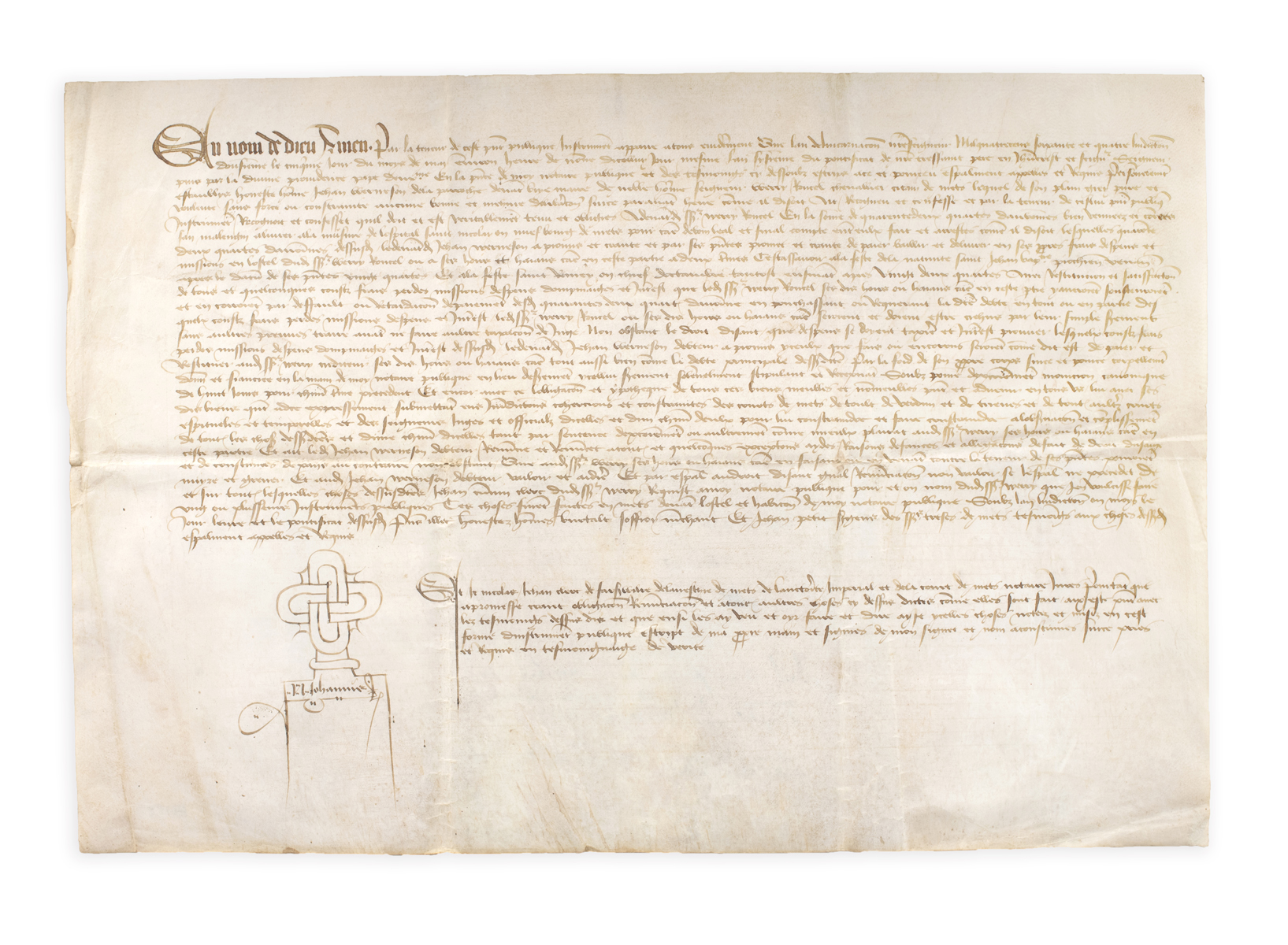RALPH FREEMAN’S COPY
XENOPHON.
De Cyri regis Persarum vita atque disciplina, libri VIII.
Paris, Andreas Wechel, 1572.
Small 4to, pp. [12], 492, [20]; a beautiful, clean copy, bound in early seventeenth-century English calf, lacking ties, early nineteenth-century rebacking, spine in compartments decorated gilt, orange morocco lettering piece; lower joint split at foot; monogram of Ralph Freeman (two R’s and an F so arranged that the spaces left by the R’s form three lozenges two and one which make up the Freeman arms) stamped in blind to both covers; ownership inscription of Aubrey Freeman ‘E libris Alberici Freeman Colle: Xti Cantabri: 1701’ to title (see below); nineteenth-century bibliographical notes to front flyleaf.
First edition of Joachim Camerarius’ Latin translation of Xenophon’s Cyropaedia, a partly fictional work on the life and education of Cyrus the Great which served as a model for medieval and renaissance mirrors of princes, including Machiavelli’s Il Principe. A beautiful copy, from the celebrated library of Ralph Freeman and then by descent to various other Freeman family members.
Sir Ralph Freeman (1589–1667) was educated at Eton College then at King’s College, Cambridge, before being admitted to the Middle Temple in 1606. He was married to Catherine Brett, a near relative of George Villiers, the future duke of Buckingham, and through the influence of the latter, Freeman was made Master of Requests, and later Auditor of the Imprests. After a few setbacks, in 1635 Freeman was made joint master of the Mint with Sir Thomas Aylesbury, a post he forfeited during the Civil War but in which he was re-appointed at the Restoration. During the Civil War Freeman was a royalist, and was eventually exiled to the continent from which he would travel back to England on a few occasions (on 12 May 1660 Pepys recorded his being in the channel aboard the frigate Lark, ‘going from the King to England’). ‘In addition to making his mark at court, in the mint, and elsewhere, Freeman was notable for his publications: two translations into English from Seneca, the Booke of Consolation to Marcia (1635) and the Booke of the Shortnesse of Life (1636), and Imperiale, on which Langbaine opined that, though he did not know if it had ever been performed, ‘it far better deserv’d to have appear’d on the Theatre than many of our modern Farces that have usurp’d the Stage’ (p. 226)’ (ODNB).
At his death, all his plate, pictures, and household possessions (likely including the library) passed to his younger son George (d. 1678) and from George to his son Ralph, MP for Reigate in 1679 and 1681. This copy eventually found its way to Aubrey Freeman (b. 1685), third son of Ralph and Elizabeth, daughter of Sir John Aubrey of Llanthridred. Born at Aspeden Hall, Aubrey attended Bishop’s Stortford School in Hertfordshire, before being admitted pensioner at Christ’s College Cambridge under M. Duckfield on 18 June 1700. He matriculated in 1701 and resided until Lady Day 1702. He died young, according to both Clutterbuck (3, 348) and Peile (I, 148).
Although the size of Ralph Freeman’s library is not known, numerous books survive with his characteristic monogram stamp. Examples of bindings with his stamp can be found at Cambridge (UL Syn.4.62.18) and All Souls, Oxford, left to the latter by a descendant also called Ralph (d. 1774) who had been a Fellow there.
On Ralph Freeman see also C.E. Challis “Freeman, Sir Ralph (d. 1667), government official and author” in ODNB; British Armorial Bindings, University of Toronto; and Book Owners Online.
Adams X-26 (lacking title); Hoffmann, III, 795; Pettegree FB 91294; USTC 170080.






